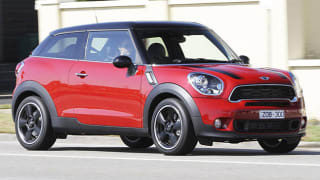
Mini Paceman 2013 review
Our dog thinks he's a lap-dog, even though he's a German Short-Haired Pointer and can comfortably...
Browse over 9,000 car reviews
Until the launch of the all-new Honda CR-Z, which the Japanese company has billed as ‘the world’s first hybrid sports coupe’, the only reason to buy a petrol-electric hybrid was to minimise emissions and fuel use.
Honda CR-Z aimed to change that by making hybrids desirable – and succeeded enough that it took out the Wheels’ magazine 2011 Car of the Year award.
Now the big names in sportscars are also working hard on developing hybrid cars, amongst them Ferrari and Porsche. These supercar hybrids are not only immensely more complex in their drivetrains than the little Honda, but also don’t do your bank balance any favours.
Honda’s long overdue NSX hybrid supercar, due in 2015, is likely to rival the big name Europeans in performance, although probably not in price – we can’t wait to get into one ourselves.
ENGINE, MOTOR AND TRANSMISSION
Power for the Honda CR-Z comes from the combination of 1.5-litre i-VTEC petrol engine and Honda’s Integrated Motor Assist (IMA) electric system. Maximum power output for the combined petrol/electric system is 100 kW with peak torque of 190 Nm (manual) or 172 Nm (automatic CVT).
CR-Z comes with a choice of six-speed manual and CVT. Though we admit that CVT is a more efficient way of transmitting power, thankfully our road test car had a ‘proper’ manual gearbox.
STYLING
Styling of the Honda CR-Z is distinctive with a sloping rear glass roof and chopped off tail that are reminiscent of the old Honda CR-X and the original Honda Insight. The latter being the first every production hybrid to go on sale in Australia.
The horizontal split panel arrangement of the rear windscreen doesn’t do a lot for vision. Drivers who don’t adjust their door mirrors correctly could get themselves into strife.
INTERIOR
Honda CR-Z is best considered as a 2+2 with the rear seats only there for emergencies. Front leg, shoulder and headroom are all good. Luggage space is reasonable at 225 litres, expanding to 393 litres with the rear seatback folded, the latter is a feature not always available in hybrids.
SAFETY
Standard safety features include front, side and curtain airbags, ABS brakes with electronic brakeforce distribution and brake assist, stability and traction control. On the crash avoidance front there are daytime running lights, LED taillights and rain sensing windscreen wipers.
TECHNOLOGY
Upmarket interior features include satellite navigation, reversing camera, panoramic glass roof, leather-trimmed front seats, climate-control air conditioning, cruise control, leather-wrapped steering wheel, Bluetooth connectivity, steering wheel-mounted controls and USB and Auxiliary inputs.
DRIVE IMPRESSIONS
This is the sort of car that cries out to be taken to your favourite country roads when traffic is light, or preferably non-existent – hills and curves that test car and driver to the limit if you want to really press yourself. The Honda couple sliced along in a most delightful way, hugging the curves and remaining beautifully balanced. The little high-revving Honda engine, aided by the extra torque provided by the electric motor was very much part of the driving enjoyment.
Torque is paramount for most driving enthusiasts and, as with all pure electric or petrol/electric vehicles, there’s plenty of it at low revs meaning that it can accelerate sharply from a standing start. Add the high revs that are characteristic of Honda engines and there’s plenty to enjoy.
Just as importantly, the CR-Z performs well in daily commutes because energy that would otherwise have been lost in a conventional car, is stored in a battery for reuse when taking off again. Once more the added torque that’s such a feature in country driving comes to the fore in traffic.
On test our fuel consumption was between four and five litres per hundred kilometres in easy freeway running, rising to sixes and sevens in town. Impressive figures given that we made no real attempt at economy driving.
Honda CR-Z has a three-mode drive system (Sport, Normal and Economy) which controls steering, throttle response and IMA assistance. ‘Sport’ mode increases throttle and steering responsiveness and increases electric motor power assistance. ‘Economy’ mode tunes the system for optimal fuel economy. ‘Normal’ balances performance, economy and emissions to suit most driving conditions.
As part of a 2013 upgrade Honda’s new Plus Sport (S+) feature was added. With the press of a button this provides extra engine and electric motor assist power. It can be used with any of three drive modes. Other 2013 enhancements include a lithium ion battery; rear LED lights; redesigned front bumper and grille; 17-inch two-tone alloy wheels and two additional exterior colours.
VERDICT
The very clever Honda CR-Z adds driving enjoyment to fuel savings and low emissions and is a true little sports machine that appeals to many drivers.
Honda CR-Z
Price: from $38,490 (manual), $40,790 (CVT),
Engine: 1.5-litre 4-cylinder petrol/electric hybrid, 100kW/190Nm (Maximum)
Body: three-door hatch
Capacity: 1.497 litres
Transmission: 6-speed manual or CVT
Boot space: 225 litres (393 litres with rear seatbacks folded)
Turning Circle: 10.8 metres
Kerb Mass: 1115 kg
Fuel Tank Capacity: 40 litres
Thirst: 5.0L/100km CO2 118g/km
Warranty: three years, 100,000 kilometres
| Vehicle | Specs | Price* | |
|---|---|---|---|
| Sport Hybrid | 1.5L, —, 6 SP MAN | $8,690 – 12,210 | 2013 Honda CR-Z 2013 Sport Hybrid Pricing and Specs |
| Luxury Hybrid | 1.5L, —, CVT AUTO | $10,450 – 14,300 | 2013 Honda CR-Z 2013 Luxury Hybrid Pricing and Specs |
| Hybrid | 1.5L, —, 6 SP MAN | $8,360 – 11,770 | 2013 Honda CR-Z 2013 Hybrid Pricing and Specs |
$8,360
Lowest price, based on third party pricing data